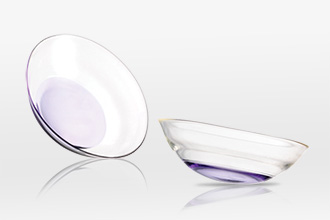Keys to Successful Contact Lens Wear

Cigna to Cover CXL-Epi Off
August 15, 2018
A Big Fall Must-Do
August 20, 2018
After patients have been successfully fit with contact lenses, a high percentage of complications and adverse reactions are related to skipping or shortcutting the recommended procedure for cleaning, disinfecting, and storing their lenses. A study revealed that 27% of patients admitted that they don’t clean their lenses daily, and it is likely that an even higher percentage of lens wearers are non-compliant in some way.
Some patients have used dishwashing liquid, baby shampoo, or even toothpaste instead of the recommended cleaners; stored their lenses dry, rather than in an FDA-approved disinfecting solution; and used saliva (which contains a host of sight-threatening microorganisms) instead of the sterile solutions that are readily available, to wet their lenses before inserting them in their eyes.
Eye infections, while infrequent, can be devastating, preventing patients from wearing their contact lenses for days or weeks and sometimes resulting in permanent corneal scarring and loss of vision. A thorough understanding of the role played by each of the rigid lens care products will help to keep lenses clean and eyes healthy.
Care Systems for Rigid Lenses
Most rigid lens care systems today use either a combination of a cleaning/soaking, a wetting/soaking, or cleaning/wetting/soaking/disinfecting solution. The most common systems are Bausch & Lomb’s Boston (Original Formula), Boston Advance Comfort Formula, Alcon’s Unique-PH, Allergan’s Comfort Care GP and Wet-N-Soak Plus.
They consist of :
- A daily cleaner, to remove tear film oils, mucus, cosmetics, and other debris from lens surfaces. Cleaning solution containers have a red tip to warn patients that the solution should not be put in the eyes. If cleaner is accidentally instilled in the eyes, it should be flushed out immediately, preferably by dunking the entire face into a sink filled with water.
- A combination wetting/soaking solution for lens storage and reinsertion in the eye, which kills bacteria and other microorganisms, keeps lenses from warping, and acts as a “cushioning agent” when the lenses are placed in the eyes.
- An optional enzymatic cleaner (in either liquid or tablet form), for patients who build up a lot of protein on their lenses. Not all rigid lens wearers need an enzymatic cleaner.
- A lubricating and rewetting drop, to instill in the eye while you are wearing lenses. This will help to flush debris from under the lenses and help the lenses to glide more smoothly and comfortably in the eyes.
The Nightly Care Routine
- Each night, before removing your lenses, wash your hands with a non-oily soap. Bar soaps, like Dial, or clear or antibacterial pump soaps are recommended. Creamy soaps like Dove and Caress transfer from hands to lens surfaces and may leave a film on the lenses.
- Dump out the old wetting/soaking solution from the lens case, rinse the case with hot water or a rinsing solution recommended by your eye care practitioner, and refill it with fresh wetting/soaking or conditioning solution. The lens case must be rinsed nightly and refilled with fresh solution in order to maintain maximum strength for disinfecting the lenses. Old solution that is merely “topped-off” will fail to kill microorganisms effectively and, if the tip from the solution container is immersed in the old solution while the bottle is squeezed, the dirty solution will be suctioned up and the entire bottle of solution contaminated.
- Always refill the case before placing your lenses in it, as they may become scratched if they are placed in a dry case.
- Set the lens case in front of you with the right compartment in front of your right hand. Remove right lens from eye.
- Place 2-3 drops of cleaner in the palm of your hand and rub the lens with it for 20 seconds. Do not rub the lens between your fingers! It may warp or crack! If the lens curvature is too steep for your index finger to clean the inner lens surface, try using your pinkie or a cotton swab.
- Rinse the lens with cool or lukewarm water. Hot water will warp the lens. Do not rinse your lenses over an open drain!
- Replace the right lens in the case and repeat the steps for your left lens.
- Soak lenses overnight or for at least 4 hours.
- In the morning, wash your hands and insert your lenses directly from the wetting/soaking or conditioning solution. Do not rinse first! The solution will help to cushion the lenses as you insert them. In addition, if the lenses are rinsed with water after they have been disinfected, there is a chance that they may become contaminated from impurities in the water supply.
Alternative Care Systems
- Most rigid lens wearers use systems with a cleaner and wetting/soaking or conditioning solutions, some may be using the Optimum by Lobob or Claris (an Allergan product). These systems contain a different group of products. They include:
- A combination cleaning/soaking/disinfecting solution, to remove tear film oils, mucus, and lens debris chemically by breaking the bonds between the deposits and the lens surfaces rather than physically by friction-rubbing with a separate cleaner. The solution also prevents lens warpage and contains benzyl alcohol to kill bacteria and other microorganisms on the lenses. These solution containers have red tips and lenses disinfected with these two systems should never be reinserted in the eyes without rinsing!
- A wetting/rewetting solution to keep the lenses from falling off the fingertip during insertion, and provide a “cushioning agent” when the lenses are placed in the eyes.
- An “Extra Strength” cleaner to be used as needed to remove stubborn deposits.
Directions for the Claris and Optimum by Lobob Systems
- Follow steps 1-3 of “The Nightly Care Routine” above. Place the lens in the palm of your hand, cover with 10 drops of cleaning/soaking/disinfecting solution, and rub for 30 seconds until the solution becomes sudsy.
- If the lenses have stubborn deposits, apply a few drops of Extra Strength cleaner and massage into the lenses for 30 seconds.
- Rinse lenses thoroughly with cool or lukewarm water and store them in solution for at least 6 hours.
- In the morning, wash your hands, remove the right lens from the cleaning/soaking/disinfecting solution, and rinse well. Inadequate rinsing will cause the lenses to sting when they are reinserted in the eyes.
- Before reinserting your lenses, apply 2 drops of wetting/rewetting solution to the lens surfaces. Do not rub it into the lens! Insert right lens and repeat for the left eye.
All-in-One Solutions
Multipurpose solutions that contain ingredients to clean, soak, disinfect, and wet rigid lenses are the most recent products to become available for RGP lens wearers. At present, the only products on the market are Bausch & Lomb’s Simplicity, and Alcon’s Unique-PH. Allergan plans to introduce, a one-bottle care system in the near future. The lenses are rubbed, flushed to remove loosened debris, soaked for at least 4 hours, and reinserted in the eyes with the same product. While these products may provide adequate cleaning for patients with good tear quality, many patients will find that they really need a separate cleaner in order to keep their lenses from becoming filmy. The convenience of one-bottle solutions may provide a good alternative for occasional use when patients travel and may prove to be the best option for patients who tend to skip the cleaning step most of the time or for those who live in or travel to places where water for rinsing off a separate cleaner may be contaminated or possibly not available at all.



